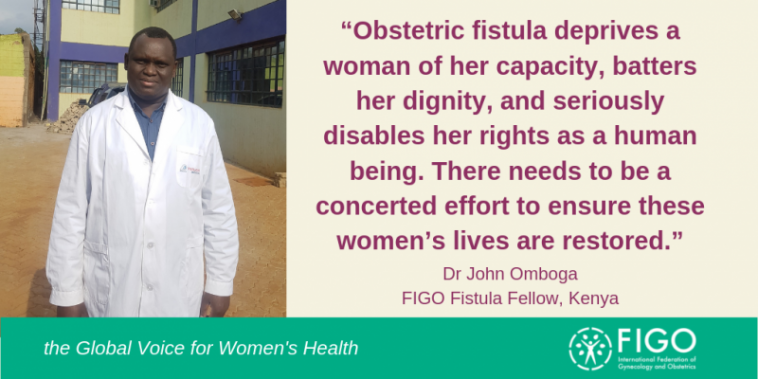In Kenya, one life-transforming surgery at a time
Obstetric fistula is a devastating childbirth injury, and a neglected public health and human rights issue.

2 million women in low-resource settings have an obstetric fistula, and up to 100,000 develop one every year. Leaking urine and / or faeces and living in despair on the margins of their own life, only 1 in 50 will ever receive treatment.
FIGO Fellows, trainee fistula surgeons from some of the world’s most underserved regions, are committed to closing this gap in care. Dr John Omboga, from Kisii Gynocare & Fistula Repair Centre in Kenya, shares his story.
Will I see an end to obstetric fistula in my lifetime? Certainly not! There are still many disadvantaged communities where access to quality medical care is a problem. Fistula is here with us, and only in time will these numbers get less.
Recently I operated on Njoki* a 16-year old girl who got married and discontinued her studies to start a family life. She came from a very poor background, and thought things would be smoother in marriage. Fast-forward a year later and she found herself heavily pregnant, with life no better. Poverty was all that she knew, and she couldn’t afford to go to the hospital for regular antenatal check-ups.
When her pregnancy reached term, she laboured at home for two days before a Good Samaritan offered to ferry her to a hospital for delivery, over 100km away. By the time she arrived she was in so much pain.
Njoki was taken immediately to theatre, but the outcome wasn’t good. Her baby had long died and her bladder and whole vagina so swollen from injury. A few days after surgery she started leaking urine uncontrollably. Without help in sight at the hospital she was discharged home, still wet.
A few weeks later, Njoki’s husband told her to pack up and go to her mother, never to return to him again. That’s when her whole world came crumbling down.
She lived with her mother until two weeks ago when one of our outreach partners found her and brought her to this hospital for treatment. She’s now well-healed, happy and very thankful to all those who have made her life-transforming surgery a reality at this hospital. She cannot believe she is dry, and ready to start her life again. She prays she finds someone who can sponsor her to go back to school, become a nurse and give care to patients like her in future!
It's sad that most of the international efforts are geared towards reducing maternal mortality and much less is focused on the reduction of morbidity like obstetric fistula. The international community needs to strategise and address morbidity as an issue of concern as well.
Obstetric fistula deprives a woman of her capacity, batters her dignity, and seriously disables her rights as a human being. There needs to be a concerted effort to ensure these women’s lives are restored.
Dr John Omboga
FIGO Fistula Fellow
Kenya
Maternal mortality is addressed in the 2030 Sustainable Development Agenda but maternal morbidity is not, even though it is a greater burden. Saving a woman from death and leaving her incontinent, isolated and devastated is not life-saving: it is a human rights violation.
On the International Day to End Obstetric Fistula, it’s time that obstetric fistula was brought back to the forefront of global conversation, to ensure that no woman is left behind. #EndFistula
* Name changed.